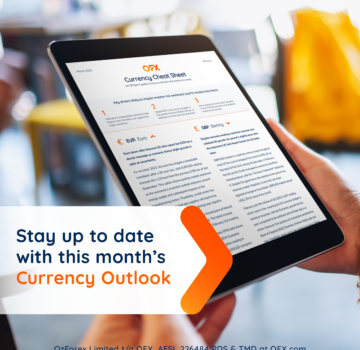By being proactive and staying informed, you could turn currency fluctuations into opportunities for growth. Here’s how Forward Contracts could help protect your money from market volatility.
What is a Forward Contract?
Simply put, a Forward Contract is a buy now, pay later option for individuals or businesses trying to take advantage of a beneficial rate today on a future payment. Forward Contracts can be a valuable currency hedging tool for individuals or businesses dealing with foreign exchange (FX).
What is a Forward Contract for currency hedging?
A currency forward contract lets you lock in an exchange rate for up to 12 months to protect against market moves. Forward Contracts are primarily used to hedge the risk of exchange rate movements. This can help you or your business avoid the risks and uncertainties associated with adverse currency movements.
It is always worth noting that locking in an exchange rate now for a future transfer could mean losing out if the market rate improves.
Hedge: In the context of foreign exchange risk, a hedge is a strategy used to mitigate potential losses due to currency fluctuations.
When is a Forward Contract useful?
Forward Contracts are often used by importers, exporters or business owners looking for a higher level of certainty in their future cash flow. Forward Contracts can also be used if your business needs to lock in an exchange rate in advance when buying supplies for the next busy season.
A Forward Contract may be useful in the following scenarios:
- Importing and exporting goods where the invoice is in a foreign currency
- Investing in foreign currencies
- Buying or selling property overseas
- Receiving pension payments from an overseas jurisdiction
- Sending or receiving funds to or from a family member or
- Repatriating salary or interest payments received overseas

Fix your rate to protect against market moves with a Forward Contract today. Learn more here.
Forward Contract Pros and Cons
A Forward Contract could be a helpful tool that saves your business money. When exchange rates are beneficial, you can lock in a rate to hedge against uncertainty in the future. This means avoiding the risks associated with adverse exchange rate movements that could impact your business’s bottom line.
You could also use Forward Contracts to fix all your known foreign exchange costs for the year ahead or use it to fix a portion of your FX costs as a way to partially hedge against exchange rate volatility.
For example, to avoid missing out on further beneficial rate movements, some businesses may use a Forward Contract for a smaller portion of their total payment (say 50%).
Volatility: Exchange rate volatility refers to the tendency for foreign currency to increase or decrease in value, which ultimately affects the profitability of an international transfer.
Here are some helpful things to consider when evaluating whether a Forward Contract is right for you or your business:
| Pros | Cons |
|---|---|
| Lock in a beneficial exchange rate for a future date | Forward Contracts are binding and cannot be terminated |
| Protection from adverse exchange rate fluctuations | Could miss out on advantageous exchange rate movements |
| Achieve greater certainty over your cash flow and budget for up to 12 months | Forward Contracts require an upfront Advance Payment to lock in the rate+ |
Please note all Forward Contracts need to be settled before the Maturity Date. The Maturity Date is the date the Forward Contract expires. Therefore the funds must be sent by this date.
Need to make a money transfer now? Move money quickly at competitive rates with our Spot Transfers. Send money now
How your business could benefit from a Forward Contract

Download our Forward Contracts fact sheet to learn how it can help you save more.
Let’s say you run a company based in the US that imports materials from the UK to produce your goods. You have a fixed monthly invoice of £50,000 to pay in USD. This exposes your business to FX risk.
If you pay the invoice in pounds when the GBP is strong, that £50,000 invoice could cost you more than paying it at a time when the GBP is weak.
By using a Forward Contract*, your business locks in an exchange rate that can help ensure predictable costs for your imports over a prolonged period. This could help your business forecast expenses and avoid potential financial setbacks caused by negative currency movements.
Take Marina Beck, a small business owner who runs Wine Alliance in Canada. When she first began working with OFX, Beck was only using spot transfers as a quick, easy, and affordable way to transfer money to vendors or pay bills.
Later on, Beck’s OFXpert Jeff identified an opportunity to help her save more and protect her bottom line from the volatility of foreign grape prices due to harvest fluctuations through the use of Forward Contracts.
When I learned about Forward Contracts it was such an interesting shift in thinking…They are useful for me because of purchasing seasons for wine and when those bills need to be paid.”
– Marina Beck, Proprietor of Wine Alliance
Using Forward Contracts to save more
See how Canadian-based business Wine Alliance found success in the volatile grape industry with OFX Forward Contracts.

Using Forward Contract for an overseas property purchase
A Forward Contract doesn’t just help businesses, it could also be advantageous for personal use.
For example, if you’re living in the United States and bought an investment property in Canada, paying your settlement fee in CAD means you’re exposed to rate fluctuations between the US dollar and the Canadian dollar.
By using a Forward Contract, you can protect yourself from adverse movements in exchange rates and take advantage of a great rate between the date of sale and the settlement date.
So no matter how the rate changes in that period, you know exactly how much you’ll need to convert to cover your settlement payment.
When Stan, an expat living in Sydney sold his house, he needed to get the funds back to Singapore. There was a 12-week settlement period, he decided to lock in a Forward Contract with OFX, which worked to his advantage.
I locked in a Forward Contract with OFX and it was very seamless… Because of the Forward Contract, it did better than the market rate when we did get our settlement funds, and the transfer back to Singapore was very easily done.”
– Stan, an OFX client who invested in a Sydney property
A better way to manage your forex risk
OFX’s Forward Contracts can help you or your business manage currency risk. All you need is an OFX personal or business account to lock in a great rate.
How a Forward Contract works
Decide the amount and the future transfer date (up to 12 months)
Get a quote at the current exchange rate and lock it in
Make the payment at the guaranteed rate on the scheduled date
Booking a Forward Contract

If you want to make a plan for future currency exchange, or ask a question, our OFXperts are here to help, 24/7.
At OFX, we require Forward Contracts to be booked over the phone with an OFXpert to ensure you understand the risks involved. Once booked, Forward Contracts can’t be terminated.
Advance Payments in a Forward Contract
An Advance Payment or deposit is required when booking a Forward Contract. This is a fixed percentage of the value of the transaction. This is normally 5% for a corporate account and 10% for a personal account. However, this amount may differ depending on the duration and assessment of the Forward Contract.
If the exchange rate moves adversely during the life of your Forward Contract you may be asked to pay a further deposit, also known as a “margin call”.
Margin call: A margin call is when OFX’s equity in a margin account falls below the financial institution or the bank’s required amount. Margin calls are requests for more funds to be added to a margin account in order to meet the margin requirements due to adverse currency movements.
Help protect yourself from foreign exchange risk with Forward Contracts
Managing foreign exchange risk is crucial for individuals and businesses with large international transactions. By understanding how Forward Contracts work and what the advantages and disadvantages are, you can make informed decisions to better manage your cash flow.
Teaming up with a reliable partner like OFX gives you or your business peace of mind. On top of great exchange rates and effective risk management tools, our OFXperts are here for you 24/7, to help provide support so you can achieve confidence and success in your global business transactions.
Explore a risk management strategy with OFX
Our OFXperts can help you find the right currency risk management strategy for your business.

IMPORTANT: The contents of this blog do not constitute financial advice and are provided for general information purposes only without taking into account the investment objectives, financial situation and particular needs of any particular person. OzForex Limited (trading as OFX) and its affiliated entities make no recommendation as to the merits of any financial strategy or product referred to in the blog. OFX makes no warranty, express or implied, concerning the suitability, completeness, quality or exactness of the information and models provided in this blog.



